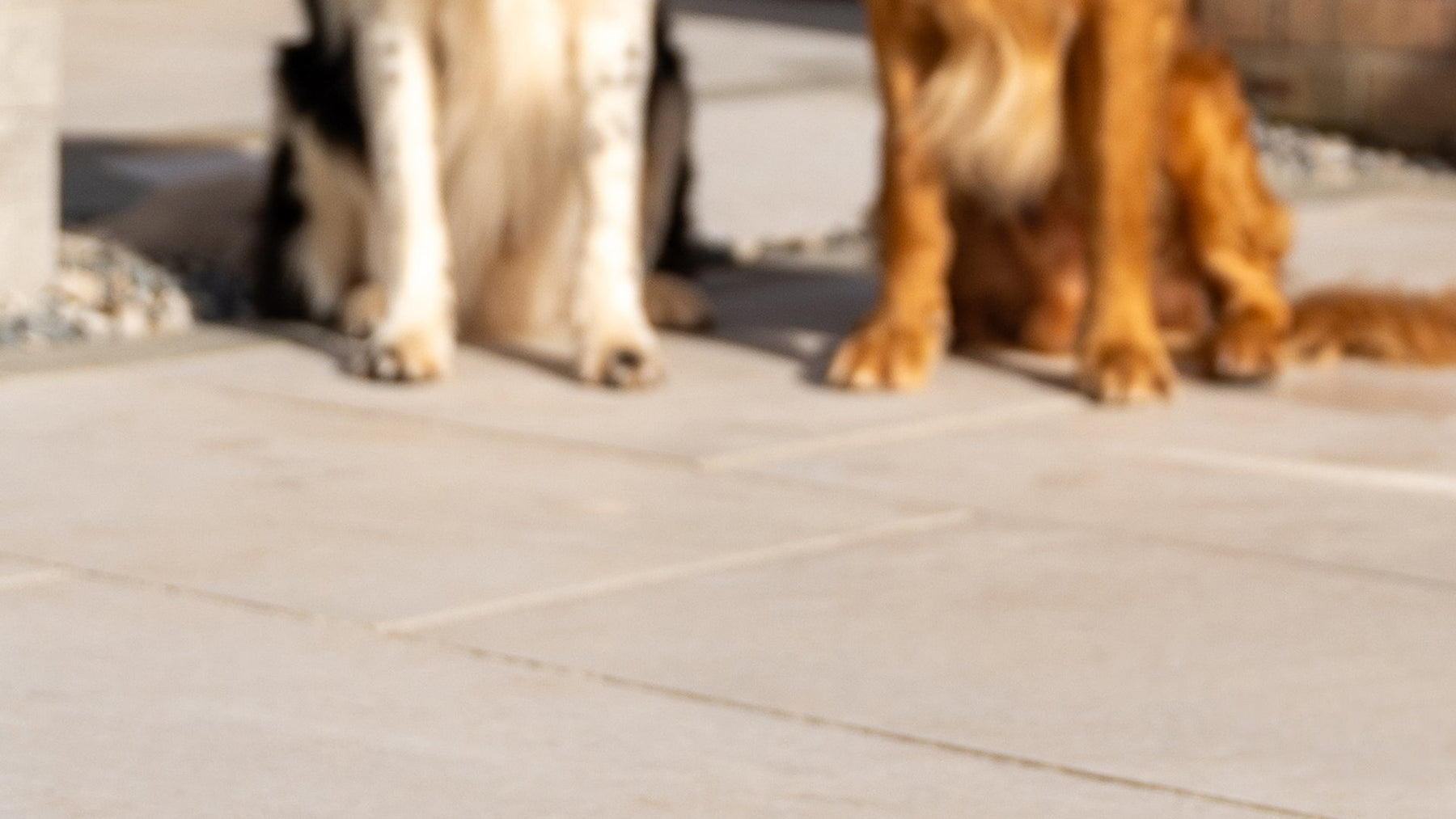0115 684 8754

The do’s and don’ts of porcelain paving
If you're considering upgrading your outdoor space, porcelain paving might be on your radar. With its sleek look and impressive durability, it’s a popular choice for many homeowners. But like any home improvement project, it’s essential to know the do's and don’ts to make sure you pick the right option for you and your home.

The do's of porcelain paving
Do: Understand the benefits of porcelain paving
Porcelain paving slabs are made from a mixture of refined clay and other natural materials, fired at high temperatures. This process makes them incredibly strong, low-porous, and resistant to water, frost, and stains. Plus, they come in a variety of styles and finishes, so you can find the perfect look for your garden or patio.
You can read more about the pros and cons of porcelain paving here.
Do: Choose quality porcelain paving slabs
When it comes to porcelain paving, quality matters. Opt for high-grade slabs that are durable, weather-resistant, and aesthetically pleasing. Quality slabs not only last longer but also maintain their look and feel over time.
Would it be cheeky to point you towards our own selection of porcelain paving now? Maybe? But we can guarantee we’ve got the high quality goods you’re looking for.
Do: Hire a professional to install
A well-prepared base is crucial for laying porcelain paving slabs. Careful preparation is vital to prevent future issues like uneven surfaces or water pooling. That is why we always recommend hiring one of our approved installers, for a hassle-free installation and peace of mind.
If you're confident in your skills and have the necessary tools, follow our step-by-step guide to ensure a long-lasting patio in your garden.
Do: Use the right grout
Using the correct adhesive and grout is essential for a secure and long-lasting installation. We have blogs which will help guide you such as choosing the right grout type and choosing the right grout colour for your projects. If you are still unsure we can put you in touch with an approved installer who can talk you through your options.

Do: Follow a laying pattern
Porcelain paving can be laid in various patterns to achieve different effects. Popular patterns include brick bond, linear, staggered, and random. Plan your pattern carefully to avoid mistakes.
Do: Consider the aesthetic you want to achieve
Porcelain pavers come in a wide range of styles, textures, and colours. They can mimic natural stone, sandstone, concrete and slate. So if you have a specific style in mind, make sure you select the correct porcelain paving to achieve your vision:
- Concrete finish: Mizo
- Natural sandstone: Kandla, Zaskar
- Stone-effect: Aravalli, Zaskar, Solaro
- Slate: Cristallo
Do: Invest in good cleaning products
In general your porcelain paving can withstand strong cleaning products. Depending on whether you’re looking for a general cleaner or a rust remover this company will have you covered.

The don'ts of porcelain paving
Don't: Overlook drainage
Proper drainage is essential to prevent water damage and slippery surfaces. Ensure your paving has a slope with a 1:60 ratio fall to allow water to run off, and check that your drainage systems are functioning correctly. If you have called a professional to do the installation, you can let them worry about this instead.
Don't: Ignore maintenance
While porcelain paving is low maintenance, it still requires some care to stay in top condition. Regularly sweep away debris with a soft brush and occasionally clean with a mild detergent.
Don't: Forget about safety
Although our porcelain slabs are slip-resistant and one of the safest paving materials available, it doesn’t mean you should try out gymnastics on it! You should still approach the surface with caution, during wet or icy conditions.
Don't: Stress about sealing your porcelain paving
Sealing your paving can provide extra protection against stains and weather damage, but that being said don’t stress about sealing porcelain paving too much, as it is a lot less porous than other materials.
Don't: Worry about furniture scratching on your porcelain paving
You don't need furniture mats to prevent scratches. Porcelain is highly resistant to scratching!

FAQs about porcelain paving
Let's dive into some of the most frequently asked questions about porcelain paving to help you make informed decisions.
Q: Are porcelain slabs slippery?
A: Porcelain slabs are designed to be slip-resistant. If this is a particular concern to you, choose textured or anti-slip variants, as these products will significantly reduce the risk of slipping. Our Paradiso range has an R12 slip rating to ensure safety for all of the family.
Q: What are the pros and cons of porcelain paving?
A:
Pros
- The texture visually mimics natural stone.
- It can be laid in various patterns such as linear, staggered, brick-bond, and random.
- It resists scratches, stains, UV rays, moss, mould, and mildew.
- It can withstand heavy foot traffic.
- It can last up to 50 years with proper installation.
- It’s low maintenance, so super easy to keep clean.
- It can be more affordable than some natural materials, plus its longevity offsets initial costs.
- It has all-round seasonal benefits, such as being UV resistant, fire-proof, and anti-slip.
Cons
- The texture feels like porcelain, not natural stone.
- There are fewer pattern variations than what you would find in natural stone.
- It shouldn’t be treated like a DIY project
- It requires careful handling during installation.
Q: How do you lay porcelain paving slabs?
A: Detailed steps can be found in our installation guides, but we recommend a professional and proper planning to ensure a successful installation.
Q: What are the common problems with porcelain paving?
A: Common issues include improper installation, poor drainage, and using the wrong cleaning products. To overcome this we recommend an approved installer and cleaning products from Hard Floor Restoration.
Q: What are the disadvantages of porcelain paving slabs?
A: Disadvantages can include a higher upfront cost compared to other materials. However, the durability and aesthetic appeal often make porcelain a worthwhile investment.

We hope this guide helps you navigate the world of porcelain paving with confidence and ease. Happy paving!


